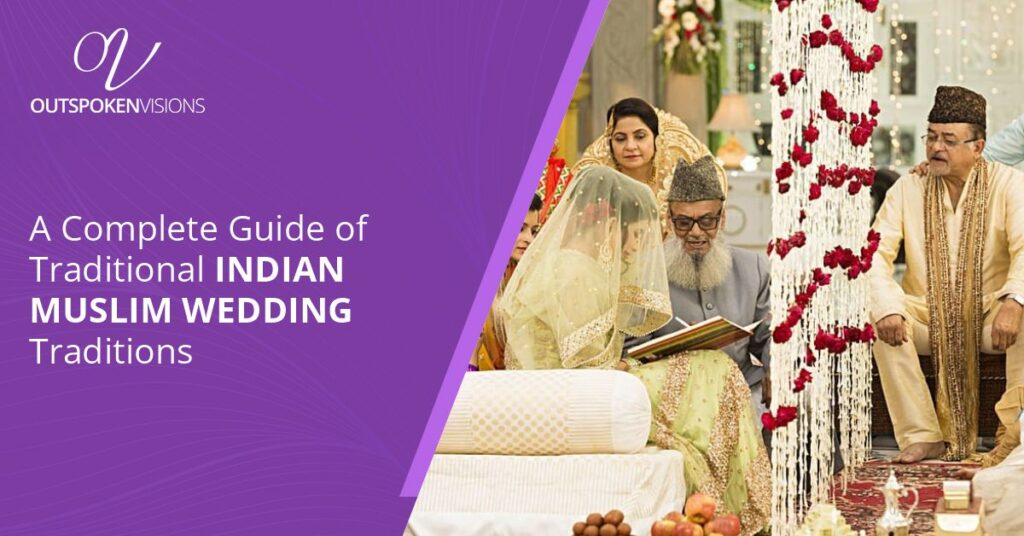Lets come to know what are the Indian Muslim Wedding Traditions and Rituals
Imagine a celebration so vibrant, it’s like a sweet spectacle of colors, sounds, and flavors! That’s an Indian Muslim wedding for you. Maybe you’re attending one or planning your own big day. Either way, you’re in for a treat.
Indian culture is so diverse and rich mainly because there are many faiths being practised there, with Islam being one of the major ones. These different religions and traditions make weddings there versatile and unique. Indian Muslim weddings in particular are known for their lively ambience, warm hospitality, and delicious food. But there’s more to these celebrations than meets the eye. The traditions and rituals of a Muslim wedding are beautiful. While these traditions are not inherently a part of Islam, they have been embraced and enthusiastically celebrated by Muslim communities in South Asia.
In this blog, we will take you behind the scenes of some major events in a Muslim wedding ceremony and share the traditions that make them so special. Let’s go!
PRE-WEDDING EVENTS
THE MANGNI ( OR ENGAGEMENT CEREMONY)
The mangni event marks the start of the couple’s wedding journey together. It’s a special event where friends and family gather and the couple officially agrees to get married. It’s like a formal engagement announcement, but with a lot more excitement and celebration.
Both the couple’s families present each other with a ring and other gifts symbolising their commitment and to celebrate the love. The highlight of this Muslim wedding ceremony is the couple placing the ring on each other’s ring finger. This moment is usually met with loud applause, cheers, and happy tears from family and friends who pray for the couple and give them blessings. Once the rings are exchanged, it’s time to celebrate with delicious food and sweet treats.
SANCHAQ
Sanchaq is a heartwarming gesture in an Indian Muslim wedding in which the groom’s family pays a special visit to the bride’s family, bearing a gift basket. The gifts typically include sweets, a stunning bridal ensemble complete with accessories and jewelry, and other tokens of their affection. This signifies the groom’s family’s blessing, support, and warm welcome of the bride into their family.
DHOLKI
A dholki is a fun and energetic event one or two days before a Muslim wedding ceremony. A dholak is a small, handheld drum that is played usually by women, accompanied by lively singing, clapping, and dancing, and is a way for ladies to express their joy and excitement. The songs are usually folk songs, passed down through generations, and are specifically sung during wedding celebrations. They’re playful, cheery, and celebratory with catchy melodies.
MAAYUN
In an Indian Muslim wedding, Maayun or Manjha is a special ceremony that happens a day or two before the big day. The bride traditionally wears a minimal yellow dress with minimal to no makeup. The bride and groom are covered in a special paste made from turmeric, sandalwood, perfume, and rose water. This paste is believed to bring beauty and blessings to the couple. Family and friends gather around to apply the paste, say prayers, and offer blessings.
MEHENDI
The Mehendi ceremony is the most awaited Muslim wedding ritual. It’s a beloved tradition in which the bride’s hands and feet are adorned with intricate henna designs. This could be a shared event or done individually by the bride and groom’s families. While some couples prefer an intimate gathering at home with close family and friends, others transform it into a grand spectacle, complete with elaborate decor, music, and choreographed dance performances.
The bride traditionally sits down in a vibrant and colorful dress ranging from a traditional lehenga or saari to gharara and shalwar Kameez. Skilled henna artists apply henna over her hands featuring flowers, leaves, and sometimes, hiding creatively, the groom’s name.
To add to the excitement, choreographed dance performances are planned, with the couple and their friends dancing to popular Bollywood or traditional wedding songs. The atmosphere is filled with laughter, music, and joy.
NIKKAH
The Nikkah ceremony is the heart of a Muslim wedding ceremony, where the bride and groom officially tie the knot. It’s a beautiful and rather intimate affair, usually held at home or in a mosque, with close friends and family gathered around. The Imam or Kazi leads the ceremony, reciting Nikkah prayers and blessings. He officiates the ceremony and reads aloud the vows of Nikkah and haq mehr.
HAQ MEHR:
Haq mehr is a symbolic payment or a worthy gift given by the groom to the wife which is an essential aspect to validate the Nikkah. It’s a way to acknowledge her rights and dignity as his partner.
During the Nikkah ceremony, the Kazi asks the bride and groom if they accept each other as husband and wife. They respond with “Qubool hai” or “I accept” which is repeated three times to emphasize their consent. This is followed by many prayers, hugs, and applause.
One traditional Indian Muslim wedding idea is the distribution of “Bidh”. It is a special combo of nuts and sweets wrapped in decorative boxes or bags and distributed among the guests.
THE WEDDING DAY
SEHRABANDI
Sehrabandi is a Muslim wedding ritual of adorning the groom’s turban or headgear with flowers, garlands, or other decor. The groom is usually seated while family members and friends decorate his turban, accompanied with music, laughter, and cheerful banter. This ceremony typically takes place on the day of the wedding before the groom takes his Baraat to the wedding venue.
BARAAT
The “Baraat” is the groom’s party of friends and family. They gather at the groom’s house, dressed to impress, and get ready to party. The groom is the star of the show and he leads the Baraat procession, accompanied by drums, dancing, fireworks, and cheering.
The groom is often seated on a decorated horse or in a luxurious car, escorted by his friends and family. The procession makes its way to the wedding venue creating a lively and festive atmosphere.
The Baraat enters the Muslim wedding venue with applause as the bride’s family sprinkles rose petals on the procession. The parents of the bride put a garland on the groom.
Once the groom is settled, the bride makes her entrance, surrounded by her family. The moment is pure magic. Usually the brides dress in an Indian musim wedding is a vibrant lehenga with glittering jewels and makeup. As she takes her place beside the groom, the atmosphere is filled with excitement and joy.
It’s followed by a dinner feast involving savory curries and sweet desserts.
In Muslim weddings, the dress code is usually modest and conservative, with the body covered appropriately, reflecting islamic values of humility and piety. Many Muslim women wear headscarves or Hijab to cover their hair. In some cases, a partition separates the men and women’s area, allowing them to celebrate together while maintaining gender segregation.
JOOTA CHUPAI
Joota Chupai is a playful tradition where the bride’s sisters or friends steal the groom’s shoes and demand a ransom in exchange for their return. It’s supposed to be a light-hearted custom to add humour to the celebration.
DOODH PILAAYI
Doodh Pilaayi is a Muslim wedding tradition in which the bride’s sister presents the groom with a specially-made drink of milk in which there’s honey, yogurt, and nuts to bless the union of the couple. But there’s a catch for the groom: in return for the milk, he must give his sister in law a special gift or money.
RUKHSATI CEREMONY
Once the guests have eaten, it’s time for the rukhsati ceremony. It’s an emotional, tear-jerker in which the bride officially bids farewell to her parental home and family. It marks the beginning of her new life with her husband and is accompanied by tears, hugs, and blessings.
THE MUSLIM MARRIAGE RECEPTION
WALIMA
Walima is a grand and festive feast hosted by the groom’s family to celebrate the wedding. Once the Nikkah and Baraat is done with, the Walima is the final hurrah. Think of it as a Muslim marriage reception.
Walima is a time to let loose and have fun and is mostly centered around mouth-watering curries, fragrant biryanis, and delicious desserts. In short, it’s a joyous conclusion to the Muslim wedding festivities.
LET’S WRAP UP
And that’s a wrap. Indian Muslim weddings are a colourful and lively celebration filled with love and prayers. From the engagement to the Walima, each ceremony is a happy expression of the couple’s love and commitment. With delicious food, vibrant decor, and happy tears, these weddings are truly unforgettable.
Whether you’re attending an Indian Muslim wedding or planning your own big day, we hope this guide has given you a glimpse into the beauty and joy of Muslim wedding ceremonies.
If you need help in planning the perfect Indian Muslim wedding, OSV is your go-to company that offers a multitude of wedding services to make your event go from zero to 100. We can help you craft a wedding that’s truly reflective of your love and commitment. Contact us today and get a quote for every service you’d like to avail.


